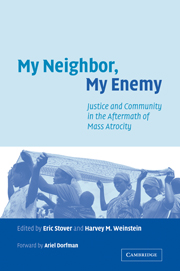Book contents
- Frontmatter
- Contents
- List of contributors
- Foreword by Ariel Dorfman
- Acknowledgments
- Introduction: conflict, justice and reclamation
- Part I Institutional approaches to justice
- Part II Social reconstruction and justice
- 7 Neighbors again? Intercommunity relations after ethnic cleansing
- 8 Memory, identity, and community in Rwanda
- 9 Attitudes toward justice and social reconstruction in Bosnia and Herzegovina and Croatia
- 10 Connecting justice to human experience: attitudes toward accountability and reconciliation in Rwanda
- 11 Public education and social reconstruction in Bosnia and Herzegovina and Croatia
- 12 Confronting the past in Rwandan schools
- Part III Survivors and justice
- Conclusion: a common objective, a universe of alternatives
- Index
9 - Attitudes toward justice and social reconstruction in Bosnia and Herzegovina and Croatia
Published online by Cambridge University Press: 05 May 2010
- Frontmatter
- Contents
- List of contributors
- Foreword by Ariel Dorfman
- Acknowledgments
- Introduction: conflict, justice and reclamation
- Part I Institutional approaches to justice
- Part II Social reconstruction and justice
- 7 Neighbors again? Intercommunity relations after ethnic cleansing
- 8 Memory, identity, and community in Rwanda
- 9 Attitudes toward justice and social reconstruction in Bosnia and Herzegovina and Croatia
- 10 Connecting justice to human experience: attitudes toward accountability and reconciliation in Rwanda
- 11 Public education and social reconstruction in Bosnia and Herzegovina and Croatia
- 12 Confronting the past in Rwandan schools
- Part III Survivors and justice
- Conclusion: a common objective, a universe of alternatives
- Index
Summary
In this chapter, we examine the factors that may contribute to or prevent the rebuilding of war-torn societies based on two surveys of attitudes and beliefs of the inhabitants of three cities – Vukovar, Mostar, and Prijedor – in Croatia and Bosnia and Herzegovina (BiH) in 2000 and 2001. Prior to the war, these three cities were integrated societies where different nationalities had intermarried and lived together in relative harmony for centuries. Since the end of hostilities in 1995, the cities have remained fairly peaceful, although conflicts between national and civic identity still continue among the three principal national groups. While the war experience of these cities may have been unique in its ferocity, it also is true that the manifestations of enmity that persist can be found in similar towns and villages throughout BiH and Croatia.
The principal goals of our survey were: to investigate some of the underlying attitudes and beliefs of the population of Mostar, Prijedor, and Vukovar toward the (re)building of community; to investigate attitudes toward reconciliation and members of other national groups; and finally, to investigate attitudes toward war crimes, war crimes trials and, specifically, the International Criminal Tribunal for the former Yugoslavia (ICTY).
Background
Psychological and social origins
The 1991–1995 wars in the former Yugoslavia will be remembered for their cruelty, including widespread war crimes, ethnic cleansing, and genocide.
Information
- Type
- Chapter
- Information
- My Neighbor, My EnemyJustice and Community in the Aftermath of Mass Atrocity, pp. 183 - 205Publisher: Cambridge University PressPrint publication year: 2004
Accessibility standard: Unknown
Why this information is here
This section outlines the accessibility features of this content - including support for screen readers, full keyboard navigation and high-contrast display options. This may not be relevant for you.Accessibility Information
- 44
- Cited by
